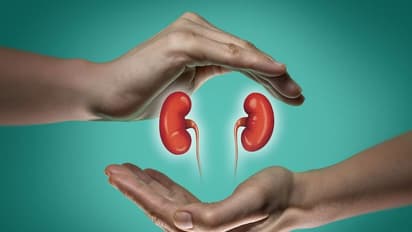World Kidney Day 2022: Interesting facts about your kidneys; expert advice on how to keep them happy

Synopsis
Dr A Santosh Kumar, Senior Nephrologist, Kamineni Hospitals, Hyderabad, has shared his opinion on World Kidney Day on March 10.
Kidneys are marvellous organs in our body. Each kidney has 10 Lakhs microfilters. So, we must maintain good kidney health. Kidneys maintain homeostasis/equilibrium by continuously monitoring and adjusting the changes in the body fluids. They retain water and salt content, remove impurities into urine, maintain haemoglobin level, bone health, and overall immunity.
If kidney-related diseases are categorised based on its function.
- The first and second stages are usually missed unless under a doctor's follow up.
- Third and Fourth stage - respond to proper medical management.
- Fifth stage- is an ideal time to discuss about the initiation of Dialysis and Transplant.
Diseases like hypertension, diabetes, other organ failures, autoimmune diseases can directly affect Kidneys. Keeping these diseases under control is of paramount importance. Regular check-ups for these diseases and medications can help prevent their side effects from affecting the kidneys.
The reported prevalence of Chronic Kidney Diseases in different regions ranges from <1% to 13%. Recently, data from the International Society of Nephrology’s Kidney Disease Data Center Study reported 17%.
Because of challenges in access to care, over 50% of patients with advanced CKD are first seen when the eGFR is <15 ml/min per 1.73 m2.
Also Read: Postpartum depression: Know the signs, causes, ways to deal and more
Who are at risk of Kidney diseases?
- Low Birthweight
- Previous Episodes of acute renal Failure
- History of dialysis
- Diabetes
- Hypertension
- Heart disease
- Liver disease
- Autoimmune Diseases
- Repeated urinary Infections
- Urinary tract abnormalities
- Family history of Kidney disease
- Cystic Diseases of Kidney
- Offending medications
- Pain killers / Herbal Supplements
Given such high prevalence of chronic Kidney disease, what can be done to reduce the burden:
Also Read: World hearing day 2022: 7 ways to prevent hearing loss while using earplugs, headphones
At individual level
1 - Have a fit lifestyle, regular exercise, healthy food, stay hydrated.
2- Avoid junk food, unnecessary medications or supplements, natural or otherwise.
3 - Regular health screening after 40 yrs of age or before if family history of Diabetes, Hypertension, heart disease, Kidney disease present.
4 - Keep your sugar and your BP under control, limit your painkiller intake and ask for alternatives.
5 - Management of Kidney disease can delay the progression to kidney failure.
Policy level
1 - Better nutrition and healthcare for mothers ensuring good fetal health.
2 - Educating in schools about Kidney disease-related symptoms.
3 - Regular screening for high-risk individuals
4 - Central registry for chronic kidney disease and organ transplants.
Explore the latest Lifestyle News covering fashion, wellness, travel, Food and Recipes, and more. Stay updated with trending Health News, fitness tips, and expert insights to inspire your daily living. Discover personalized lifestyle trends that keep you stylish and informed. Download the Asianet News Official App from the Android Play Store and iPhone App Store for everything that adds value to your everyday life.